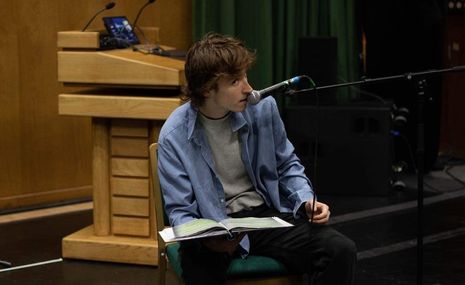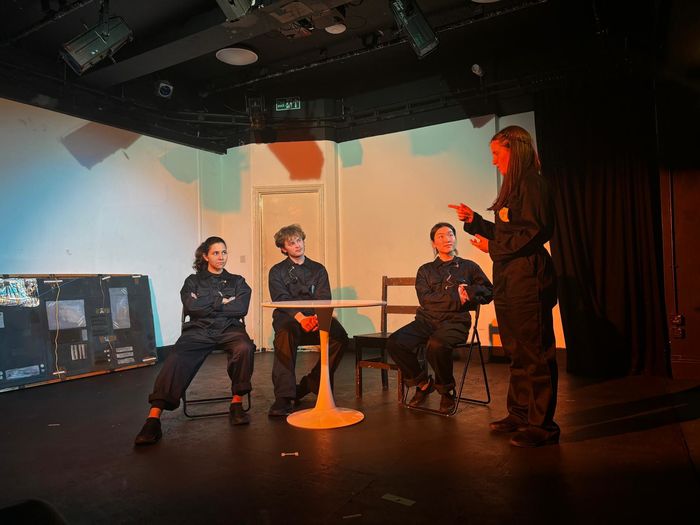Prairie du Chien & Bugles at the Gates of Jalalabad weaves sound with storytelling
A double-bill bringing together two sets of stories and worlds in an intimate and tender theatrical experience

Through a ‘Backstage’ door and into the wings of the Fitzpatrick hall, this intimate double bill takes place in a small white box taped on the floor. Without set, and with minimal costumes, this production is stripped back, with sound taking centre stage in Prairie and Bugles’ thoughtful simplicity.
David Mamet’s Prairie du Chien short play forms the first act. Set on an early twentieth century train crossing Wisconsin the mesmerising Storyteller (Josh Herberg) recalls a tale of infidelity and murder to his passengers. With atmospheric tension rising as two other passengers (Jake Burke and Kiko Gomersall) play a high stakes game of gin rummy, the audience are as hooked on the story as the Listener (Jules Coyle) is. It is a masterclass of theatre in isolation, enrapturing audience members in a tale brought to life not by visuals but by the characters in front of us. Stephen Jeffreys’ Bugles at the Gates of Jalalabad follows. Set in 1842, after the British Army’s devastating defeat and subsequent retreat from Kabul, the diaries of the captured Lady Florentina Sale (Maia von Malaisé), weave in amongst a dialogue of four British Buglers awaiting their fate.
It is an interesting pair of plays that director Ralph Jeffreys puts in dialogue together. United first in their prioritising of storytelling and second in their moments of fear and uncertainty; the success of such a pairing heavily relies on the production’s storytellers. Both Herberg and von Malaisé are exceptional in their storytelling roles. With voices so rich and engaging I could listen to them for hours (both should seriously consider a career in audiobooks) they demonstrated expert pacing as perfect narrative guides.
“Without set, and with minimal costumes, this production is stripped back, with sound taking centre stage”
Much effort is made to separate the cast from their characters initially. As Gomersall introduces the plays it is clear that the cast’s primary function is as storytellers. It does not matter that we have seen them chatting on stage as the audience enters, because they will create the story in the box in front of us, with the audience’s imagination filling any gaps. It is in Gomersall’s address to the audience that this gap begins to be filled as he invites us to shut our eyes and imagine. The train sound playing through the speakers instantly transports us to a Mamet’s miniature world.
Sound, in its acute aid of storytelling (designed by Talulah Thomas and Lily Casey), was a distinct triumph of this show. With the small space utilising multiple microphones to create an effect similar to that of a radio play, Thomas and Casey succeed in their formation of setting through sound. The storytellers’ handheld microphones also provided them with a distinct level of authority in an object they interacted with decisively and successfully. The train sounds that provided setting and ambience slowly morph into non-diegetic, atmospheric sound as the audience is pulled further into the Storyteller’s increasingly vivid story.
“This production is the epitome of successful student theatre.”
This is also one of the very few productions I have seen where the use of scripts does not diminish the potential of the show. I did not get the impression that the scripts were necessary to prompt the actors but that they existed as the sources of stories on stage. Sometimes they were swapped amongst the cast, or flicked through as if they contained the answer to their questions. In Bugles the choice for scripts to be placed on music stands and carried with the soldiers instead of rifles was inspired. A particularly powerful moment came when Afzal (Gomersall) attempted to disarm such soldiers, as it was their scripts he took from them.
Overall, this production is the epitome of successful student theatre. I applaud Jeffreys’ direction as the small space and decisive removal of certain elements genuinely adds to the storytelling. The audience are immersed in two diverse worlds presented masterfully by an extremely capable cast and production team.
Prairie du Chien & Bugles at the Gates of Jalalabad: A Double Bill is showing until Saturday 9 March at Fitzpatrick Hall, Queens’ College.
 Interviews / You don’t need to peak at Cambridge, says Robin Harding31 December 2025
Interviews / You don’t need to peak at Cambridge, says Robin Harding31 December 2025 Comment / What happened to men at Cambridge?31 December 2025
Comment / What happened to men at Cambridge?31 December 2025 News / Unions protest handling of redundancies at Epidemiology Unit30 December 2025
News / Unions protest handling of redundancies at Epidemiology Unit30 December 2025 Features / ‘Treated like we’re incompetent’: ents officers on college micromanagement30 December 2025
Features / ‘Treated like we’re incompetent’: ents officers on college micromanagement30 December 2025 News / Varsity’s biggest stories of 202531 December 2025
News / Varsity’s biggest stories of 202531 December 2025










